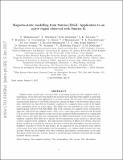Files in this item
Magneto-static modeling from SUNRISE/IMaX : application to an active region observed with SUNRISE II
Item metadata
| dc.contributor.author | Wiegelmann, T. | |
| dc.contributor.author | Neukirch, Thomas | |
| dc.contributor.author | Nickeler, D. H. | |
| dc.contributor.author | Solanki, S. K. | |
| dc.contributor.author | Barthol, P. | |
| dc.contributor.author | Gandorfer, A. | |
| dc.contributor.author | Gizon, L. | |
| dc.contributor.author | Hirzberger, J. | |
| dc.contributor.author | Riethmüller, T. L. | |
| dc.contributor.author | Noort, M. van | |
| dc.contributor.author | Rodríguez, J. Blanco | |
| dc.contributor.author | Del Toro Iniesta, J. C. | |
| dc.contributor.author | Suárez, D. Orozco | |
| dc.contributor.author | Schmidt, W. | |
| dc.contributor.author | Pillet, V. Martínez | |
| dc.contributor.author | Knölker, M. | |
| dc.date.accessioned | 2017-01-11T15:30:12Z | |
| dc.date.available | 2017-01-11T15:30:12Z | |
| dc.date.issued | 2017-03-22 | |
| dc.identifier | 248746325 | |
| dc.identifier | 35a5031e-b30f-4770-ab45-3691c19fa96c | |
| dc.identifier | 85016149870 | |
| dc.identifier | 000397557300018 | |
| dc.identifier.citation | Wiegelmann , T , Neukirch , T , Nickeler , D H , Solanki , S K , Barthol , P , Gandorfer , A , Gizon , L , Hirzberger , J , Riethmüller , T L , Noort , M V , Rodríguez , J B , Del Toro Iniesta , J C , Suárez , D O , Schmidt , W , Pillet , V M & Knölker , M 2017 , ' Magneto-static modeling from SUNRISE/IMaX : application to an active region observed with SUNRISE II ' , Astrophysical Journal Supplement Series , vol. 229 , no. 1 , 18 . https://doi.org/10.3847/1538-4365/aa582f | en |
| dc.identifier.issn | 0067-0049 | |
| dc.identifier.other | ArXiv: http://arxiv.org/abs/1701.01458v1 | |
| dc.identifier.other | ORCID: /0000-0002-7597-4980/work/34032270 | |
| dc.identifier.uri | https://hdl.handle.net/10023/10083 | |
| dc.description.abstract | Magneto-static models may overcome some of the issues facing force-free magnetic field extrapolations. So far they have seen limited use and have faced problems when applied to quiet-Sun data. Here we present a first application to an active region. We use solar vector magnetic field measurements gathered by the IMaX polarimeter during the flight of the \sunrise{} balloon-borne solar observatory in June 2013 as boundary condition for a magneto-static model of the higher solar atmosphere above an active region. The IMaX data are embedded in active region vector magnetograms observed with SDO/HMI. This work continues our magneto-static extrapolation approach, which has been applied earlier ({\it Paper I}) to a quiet Sun region observed with \sunrise{} I. In an active region the signal-to-noise-ratio in the measured Stokes parameters is considerably higher than in the quiet Sun and consequently the IMaX measurements of the horizontal photospheric magnetic field allow us to specify the free parameters of the model in a special class of linear magneto-static equilibria. The high spatial resolution of IMaX (110-130 km, pixel size 40 km) enables us to model the non-force-free layer between the photosphere and the mid chromosphere vertically by about 50 grid points. In our approach we can incorporate some aspects of the mixed beta layer of photosphere and chromosphere, e.g., taking a finite Lorentz force into account, which was not possible with lower resolution photospheric measurements in the past. The linear model does not, however, permit to model intrinsic nonlinear structures like strongly localized electric currents. | |
| dc.format.extent | 1514238 | |
| dc.language.iso | eng | |
| dc.relation.ispartof | Astrophysical Journal Supplement Series | en |
| dc.subject | Sun: magnetic topology | en |
| dc.subject | Sun: chromosphere | en |
| dc.subject | Sun: corona | en |
| dc.subject | Sun: photosphere | en |
| dc.subject | QB Astronomy | en |
| dc.subject | QC Physics | en |
| dc.subject | NDAS | en |
| dc.subject.lcc | QB | en |
| dc.subject.lcc | QC | en |
| dc.title | Magneto-static modeling from SUNRISE/IMaX : application to an active region observed with SUNRISE II | en |
| dc.type | Journal article | en |
| dc.contributor.sponsor | Science & Technology Facilities Council | en |
| dc.contributor.sponsor | Science & Technology Facilities Council | en |
| dc.contributor.institution | University of St Andrews. Applied Mathematics | en |
| dc.contributor.institution | University of St Andrews. School of Mathematics and Statistics | en |
| dc.identifier.doi | 10.3847/1538-4365/aa582f | |
| dc.description.status | Peer reviewed | en |
| dc.identifier.grantnumber | ST/K000950/1 | en |
| dc.identifier.grantnumber | ST/N000609/1 | en |
This item appears in the following Collection(s)
Items in the St Andrews Research Repository are protected by copyright, with all rights reserved, unless otherwise indicated.

